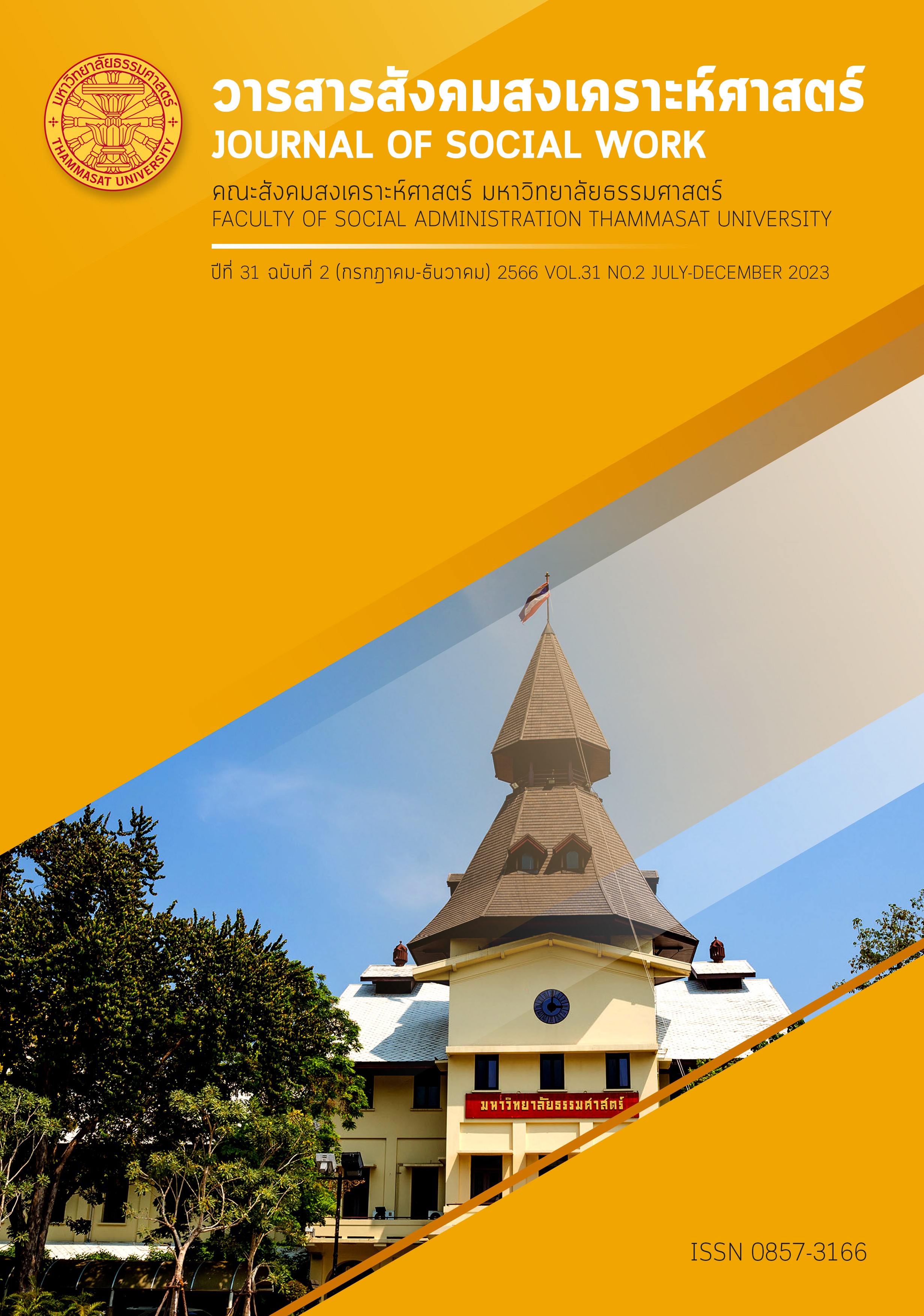Factors Affecting Emotional Intelligence of Juveniles Offenders: A Case of Juveniles Sentenced to Attend Training at a Child and Youth Training Center
Keywords:
Emotional intelligence, Juvenile offenders, Juvenile training centerAbstract
This study examines the emotional intelligence of juvenile offenders and the factors affecting the different emotional intelligence of juvenile offenders by using quantitative methodology. The population of this study was 56 juvenile offenders, consisting of 44 young men and 12 young women. Which suggested a sample of 48 people, Data were analyzed using descriptive statistics as well as inferential statistics.
The study found that children and youth with different family statuses have different self-control, decision making and problem-solving abilities. Children and youth with have different intellectual abilities (IQ) have different emotional intelligence (EQ) in decision-making and problem-solving abilities. However, different levels of education have no effect on differences in emotional intelligence.
Results of studies on external factors found that children and youth who were adolescents raised under different parenting styles. There are with EQ have different in responsibility and motivation. Children and youth with different peer relationships. There are with EQ have different in responsibilities and motivations. However, environmental factors had no effect on emotional intelligence.
References
กรมพินิจและคุ้มครองเด็กและเยาวชน. (2564). รายงานการดำเนินงานของรัฐต่อสาธารณะรายปี ประจำปีงบประมาณ พ.ศ.2564. กรุงเทพฯ: กรมพินิจและคุ้มครองเด็กและเยาวชน.
กรมสุขภาพจิต. (2543). อีคิว: ความฉลาดทางอารมณ์. กรุงเทพฯ: กระทรวงสาธารณสุข.
กันตวรรณ มีสมสาร. (2544). การเปรียบเทียบความฉลาดทางอารมณ์ของเด็กวัยย่างเข้าสู่วัยรุ่นที่ได้รับการอบรมเลี้ยงดูในรูปแบบที่แตกต่างกัน
ตามการรับรู้ของตนเอง. วิทยานิพนธ์ปริญญามหาบัณฑิต, จุฬาลงกรณ์มหาวิทยาลัย, บัณฑิตวิทยาลัย.
จิตสุภา ไวทยวรรณ. (2543). ความสัมพันธ์ระหว่างเชาว์ปัญญาและเชาว์อารมณ์ในเยาวชนไทย. วิทยานิพนธ์ปริญญามหามหาบัณฑิต, จุฬาลงกรณ์มหาวิทยาลัย.
จุไรรัตน์ กำแพงพันธ์. (2551). การทำหน้าที่ของครอบครัว ความฉลาดทางอารมณ์ และทัศนคติต่อการ กระทำผิดของวัยรุ่นชายในศูนย์ฝึกและอบรมเด็กและเยาวชน เขต 2 จังหวัดราชบุรี. วิทยานิพนธ์ปริญญามหาบัณฑิต, มหาวิทยาลัยเกษตรศาสตร์, สาขาจิตวิทยาชุมชน.
ธีรวุฒิ เอกกุล. (2543). ระเบียบวิธีวิจัยทางพฤติกรรมศาสตร์และสังคมศาสาตร์. สถาบันราชภัฎอุบลราชธานี.
นิกร น้อยรักษา. (2548). การศึกษาบุคลิกภาพและความฉลาดทางอารมณ์ของเยาวชนที่กระทำผิด. วิทยานิพนธ์ปริญญามหาบัณฑิต, มหาวิทยาลัยราชภัฏราชนครินทร์.
พัชรินทร์ ไชยวงศ์. (2545). การอบรมเลี้ยงดูกับความฉลาดทางอารมณ์ของนักเรียนชั้นมัธยมศึกษาตอนต้น โรงเรียนสันป่าตองวิทยาคม จังหวัดเชียงใหม่. บัณฑิตวิทยาลัย, มหาวิทยาลัยเชียงใหม่.
รัดใจ เปียแก้ว. (2545). ปัจจัยทางครอบครัวที่มีผลต่อความฉลาดทางอารมณ์ของวัยรุ่นตอนต้น. กรุงเทพฯ: สังคมสงเคราะห์ศาสตรมหาบัณฑิต, มหาวิทยาลัยธรรมศาสตร์.
วีระชัย เหล่าลงอินทร์. (2552). การกระทําผิดซํ้าของผู้ต้องขังในเรือนจําจังหวัดมหาสารคาม. วิทยานิพนธ์ปริญญามหาบัณฑิต. มหาวิทยาลัยราชภัฏมหาสารคาม.
วิทยากร เชียงกูล. (2552). จิตวิทยาวัยรุ่น: ก้าวข้ามปัญหาและพัฒนาศักยภาพด้านบวก. กรุงเทพฯ: สำนักพิมพ์สายธาร.
วัลลภ ปิยะมโนธรรม. (2544). คุยกับนักจิตวิทยาคลายปัญหาลูกวัยรุ่น. กรุงเทพฯ: ซีเอ็ดยูเคชั่น.
สุดา สินทรโก. (2546). ความฉลาดทางอารมณ์ของนักเรียนชั้นมัธยมศึกษาปีที่ 5 จังหวัดหนองบัวลำภูที่มีรูปแบบการอบรมเลี้ยงดูที่ต่างกัน. จิตวิทยาการศึกษา, มหาวิทยาลัยมหาสารคาม.
ศรีเรือน แก้วกังวาล. (2549). จิตวิทยาพัฒนาการชีวิตทุกช่วงวัย วัยรุ่น-วัยสูงอายุ (พิมพ์ครั้งที่ 9). กรุงเทพฯ: สำนักพิมพ์มหาวิทยาลัยธรรมศาสตร์.
อารีย์ ตัณฑเจิญรัตน์. (2543). อารมณ์และสุขภาพจิต. ศึกษาศาสตร์, มหาวิทยาลัยนเรศวร พิษณุโลก.
Laura-Elena, N., & Kincso, S. (2012). Adolescents’ emotional intelligence and parental styles. Procedia - Social and Behavioral Sciences, 33, 478-482.
Mohammadyari, G. (2011). The Relationship between parental style and emotional intelligence among students of payame noor university. Retrieved August 18,2022, from https://www.semanticscholar.org/paper/THE-RELATIONSHIP-BETWEEN-PARENTAL-STYLE-AND-AMONG-Mohammadyari/360484fe7cbe2c3d5a0bc6e559fe6f986911d066
Downloads
Published
How to Cite
Issue
Section
License
Copyright (c) 2023 Journal of Social Work

This work is licensed under a Creative Commons Attribution-NonCommercial-NoDerivatives 4.0 International License.
The manuscripts published in the Social Work Journal is the copyright of the Social Work Journal, Thammasat University
Any article or opinion appeared in the Social Work Journal will solely be under the responsibility of the author The Faculty of Social Administration, Thammasat University and the editors do not need to reach in agreement or hold any responsibility.



